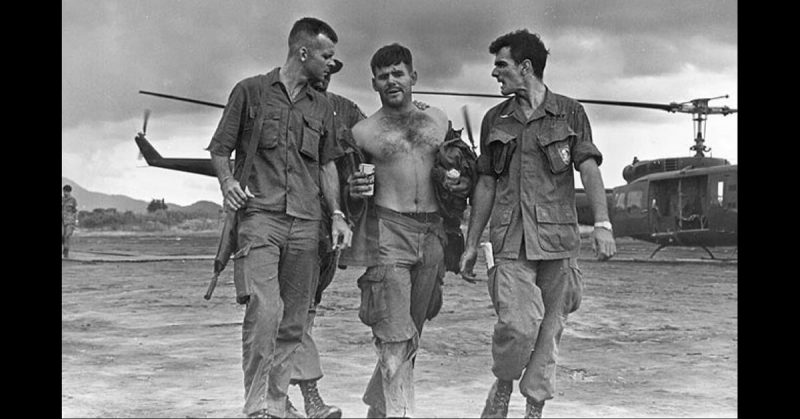Gary Michael Rose retired as a captain in the US Army. It was as a sergeant that he performed the heroics that earned him the Distinguished Service Cross in 1971. On October 23, 2017, that award will be upgraded to the Medal of Honor, the highest honor in the US military. Rose will receive the award from President Donald Trump in a ceremony at the White House.
During a secret mission into Laos in 1970, known as “Operation Tailwind,” Rose was the lone medic in a Studies and Observations Group (SOG) team of 120. The team raided deeper into Laos than any team before them in order to distract the enemy and draw them away from Hmong tribal battalions that were trying to recapture southern Laos from the North Vietnamese Army (NVA). The Hatchet Group consisted of Green Berets for non-commissioned officers (NCOs) with Chinese Nungs and Montagnard tribesmen in the ranks.
As they were flown into Laos in Sikorsky helicopters, they took enemy fire from the NVA. Several soldiers were wounded before the helicopters had a chance to land. Captain Eugene McCarley immediately got the men moving out of fear that the NVA would pinpoint their location and begin dropping shells on them. For the next three days, the Hatchet Group would be almost constantly moving, covering 15 miles in that time through thick jungle, enemy encounters and stopping mainly to destroy any bunkers and/or ammunition they discovered.
By dawn on the second day, after a night of constant moving and fighting, nine of the sixteen Americans were wounded, and more of the Montagnard fighters were hurt. Sgt. Rose kept all of them alive and able to move with the rest of the team.
By the end of the second day, there were more than 24 men injured in the group. A CH-53 helicopter landed to take on the wounded but had to fly away when it took heavy fire. As it flew off, an NVA rocket punched a hole through the fuselage, then out the other side without detonating. It did rupture a fuel tank, and the chopper had to make an emergency landing. A second CH-53 was shot down when it came to rescue those on the first one. A third helicopter got them all to safety.
The remaining members of the Hatchet Group continued with Sgt. Rose running into enemy fire to treat the wounded. Sometimes, he was working on up to five wounded men at a time. That night, when the team finally stopped to rest, Rose was hit by shrapnel from an NVA RPG. Disregarding his own injuries, Rose crawled through enemy fire to help two wounded Montagnards. He continued working while the others slept or ate, doing whatever it took to save lives.
The third day they continued moving and fighting. The number of injured men reached 49 and Rose struggled to keep up with all of the injuries.
It was on that third day they made their most important discovery, hundreds of pounds of documents. The team loaded them up and carried them with them. When the Army commanders got to see those documents later, they were amazed. It was the biggest, most valuable trove of information on the enemy they had ever recovered during the war.
It was time for the team to leave, but they had to abandon landing zone after landing zone after they would come under attack by the NVA. With the helicopters that were coming to take them out of Laos running out of fuel, the team finally got on while the NVA was closing in fast behind them.
Thanks to the efforts of Sgt. Rose, Company B of the Hatchet Group lost only three Montagnards. 33 Montagnards and all sixteen of the Americans were wounded. In return, the team had killed 144 NVA soldiers, injured an additional 50 and called in airstrikes that killed an estimated 288 more enemy soldiers.
Sgt. Rose was submitted for the Medal of Honor at the time, but it was downgraded to the Distinguished Service Cross.
In June of 1998, CNN showed a program called “NewsStand.” The show included an investigative piece called “Valley of Death” by Peter Arnett, a Pulitzer Prize winner. The show used recently declassified documents to accuse the members of the Operation Tailwind team of war crimes including destroying a village, raping women and children and using sarin gas which is banned by international law.
Defense secretary, William Cohen, ordered an investigation by the military. The investigation found no wrongdoing by the Hatchet Group involved in Operation Tailwind. CNN then launched their own investigation and retracted their story leading to CNN severing ties with Arnett.
As a result of the investigation, the Military Assistance Command Studies and Observations Group received a presidential citation in 2001 that equates to a Distinguished Service Cross for every Green Beret who ever served with the group. Also, Sgt. Rose’s case for a Medal of Honor was reopened, leading to the ceremony next month.
Rose, now 69 years old, said that the medal was for all of the soldiers that served in MACSOG. He feels that it represents the courage and honor of those men.
